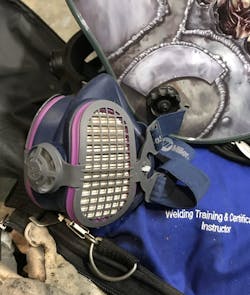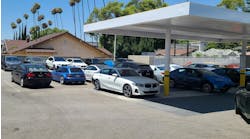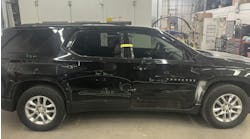Content brought to you by ABRN. To subscribe click here.
What you will learn:
• Poor safety habits can lead to health issues
• Mechanics are more likely to be injured or killed on the job
• Safety is everyone's responsibility
You've read the title, and you're probably thinking, "Oh great, he's going to preach to us about keeping extension cords out of standing water and open flames away from the mixing room."
Given the subject matter, I could easily go over all those safety aspects in a shop. It would indeed be worth discussing, but I'm going to cover something I feel most of us don't think about when it comes to our daily routines. I would like to have you consider the long-term effects of poor workplace safety habits. Specifically, those that can cause health issues later in life.
While we are all primarily focused on the day-to-day operations within our centers, it is also a worthy endeavor to take some time and assess the practices of your technicians. It would be best to ask yourself during those observations, "Are they practicing good habits regularly?"
Nothing we cover moving forward should lessen the concern for injuries we all may be aware of. A U.S. Bureau of Labor Statistics article titled Occupational Injuries, Illnesses, and Fatalities to Automotive Service Technicians and Mechanics, 2003 to 2005, concludes by stating:
"Mechanics are more likely than the average worker to be injured or killed on the job, as evidenced by higher rates of fatalities and injuries and illnesses. For both fatal and nonfatal injuries, contact with objects and equipment, such as parts and materials and vehicles, represents a significant hazard. Many of the remaining nonfatal cases are due to overexertion and sprains and strains. Assaults and violent acts are a leading cause of workplace fatalities."
Keep in mind, the above is mostly preventable. Nevertheless, I would like to focus on habits that promote long-term success.
Hearing protection is needed not just for your own tool use
I will begin by telling you that I live with a condition that is most likely a result of my cavalier attitude towards remaining healthy as I aged. While I consider myself incredibly lucky not to have any knee, back, or other problems, as I think back to my days of jumping up and down off a frame rack or spending countless hours on my knees while sanding or building a door, I do have a condition called tinnitus. It's a ringing in my ears 24 hours a day, seven days a week, 365 days a year.
I am fairly sure the tinnitus results from not wearing the proper hearing protection when I should have been. I used earmuffs quite regularly, as they were typically hanging on the lid of my opened cart. I would use them whenever I considered myself doing something "loud." The problem was that I would not use them when someone else in the shop was doing something that would have called for their use. Air hammers/chisels were common to use back in the day while removing a welded panel during a replacement operation.
Thirty years ago, belt sanders were not common, and the steel was relatively thicker. While I would don my earmuffs when I plugged mine in, typically, if the technician across the aisle was using one, I would forego using mine as I was "too busy to put them on" or "they are far enough away, I'll be fine."
There are still several situations today that would require a technician to use hearing protection. There is a decibel number level, but let’s be honest, I don't think we will be monitoring that. The simple rule is that if you have to raise your voice to have a normal conversation with someone nearby, you should have hearing protection in place.
My point is that little time was spent considering my health for most of my lengthy career on the shop floor. It's not to say I was deemed reckless; I typically wore a basic dust respirator while using body filler and a charcoal type respirator when I used to paint early in my career. I shifted to exclusively doing collision repair and left the refinish aspects to others some time ago. I will pat myself on the back for paying more attention to safety in my late 40s, but the damage most likely had already been done. Nevertheless, I consider myself healthy and fortunate. Enough about me; let's move forward and help our fellow technicians avoid the same or similar fate.
It is not hard to find guidance for typical safety-related concerns. We should all know that proper eye protection is required at all times by anyone in the shop. Employees or visitors are no different. Eye protection is needed in the shop's work area, with no exceptions. Hand protection is a relatively simple rule to follow, albeit several scenarios differ regarding hand protection. One of those is when there may be a risk of abrasions or cuts while handling sharp objects.
Another aspect of hand protection is avoiding burns from welding, using a glue pull repair process, or any other myriad of situations we encounter where an injury may occur. Yet another aspect is that of using hand protection while dealing with any of the many different chemical products we may use. Those can range from cleaners, refinish-related products, or those associated with mechanical operations.
The list of varying chemicals in today's collision repair center can be quite extensive, if you think about it. Foams, sealers, and other non-liquid products also warrant the use of hand protection regularly. Wearing proper eye and hand protection can avoid a long-term situation of permanent damage, whereas one hopefully can fully use both forever if the proper protection is used regularly.
Consider respirators for various tasks
Respiratory protection is another safety-related item to consider and has many distinct aspects. The most common and likely first to come to mind would be those operations related to the refinish process. Conversely, the least considered during my observations are those pertaining to welding and the use of foams or other similar products. It is a seldom-seen practice to wear a respirator while welding, but if you stop and think about the fumes generated during that process, it should be second nature to wear the proper protection. If you don't know, manufacturers offer several different respirators designed for that particular function, including those that fit within the welding hood.
It's also common for the technician to be very close to the action.
Consider a refinishing technician spraying a panel with his or her head close to the material hitting the panel and not wearing proper respiratory protection.
It's an alarming thought, yet we don't think twice when we see a technician's face mere inches from the workpiece while welding. The long-term effects of not using proper respiratory protection could lead to a myriad of conditions later in life. Let's change that narrative in our industry. Today is a good time to start.
Little habits can turn into larger physical challenges
As I mentioned initially, daily workplace habits will hopefully encourage a more successful "later in life" absence of issues. Even the small things can matter.
For example, a painter I worked with early in my career named Al was near retirement age and had been a painter since entering our industry as a young man. When I met him, I would say he had amassed 40-plus years of experience. He had been having issues with pain in one hand. It wasn't the hand he typically used to spray with, and there had been no trauma to the hand that was causing him constant discomfort. He was otherwise relatively healthy by all accounts.
After several trips to various doctors and many tests were run, there seemed to be no logical reason for the pain. He resigned to living with it as best he could.
Fast forward a few years later, and Al was in a doctor's office for a routine visit. The doctor had read his history and inquired about his issue. The discussion began, and the unrelated examination continued. At one point, the doctor stopped and looked at Al.
"Al, how do you close the lid on a paint can?" the doctor asked him.
They both knew at that moment the answer had come forward. You see, many years ago, before we commonly used disposable plastic cups, almost every job required mixing paint in a metal quart can with a metal lid. The cups on the spray guns were metal and cleaned between each operation.
Once the paint from the quart or gallon can was poured into the paint gun cup, the metal lid was put back on the can. Guess how Al closed/sealed the top? Yep, with his palm.
Forty-plus years of that palm pushing down on a metal can lid to seal it had likely damaged the tendons in his hands beyond repair. The better idea would be to use a hammer or similar tool to push the lid down.
Where to make changes
So, how can we make changes in our shop? Look at what is going on, not in the classic safety sense, although that should be considered daily as well, but with an eye toward repetition and general good common-sense practices:
- Do you have small step stands for the frame machine/bench system? Even if you have a machine that retracts near or to the floor, is there the proper equipment readily available if the need arises to climb up for any reason? Those same steps/stands may be used to get into the bed of a truck.
- Do your technicians have the proper equipment available for kneeling?
- Do your technicians have the proper respirators for welding and other dust control measures?
It's likely the refinish technicians have available the appropriate equipment, as it seems our industry does a fairly good job around that. But is everyone in your shop completing the fitment test required for those respirators? It is more important to address that ability, often more so than the obligatory once-a-year "check a box" routine. It should be discussed regularly, and questions around that and other personal health concerns in your daily meetings. We typically focus on vehicles, but we should be equally concerned with the health and safety of our coworkers, including the long-term.
I challenge you to consider good workplace habits for today and future good health.
My goal would be to have technicians who have reached retirement age and left the industry to come back later to visit and be in good health!
It's going to be a lot more enjoyable to reminisce about the "good old days" of tape ball and airsoft wars than discussing physical challenges that may have been incurred. Of course, I'm not condoning airsoft or tape ball wars in a shop, but I will advocate for a long healthy life. Since I brought it up, you may be wondering if I had any involvement in the aforementioned "wars." I will say this: I know of no proof that would implicate me.





